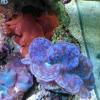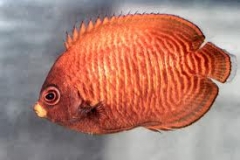Search the Community
Showing results for tags 'centropyge aurantia'.
-
I was enchanted by this beautiful and shy dwarf angel when I first started reefing more than 20 years ago. Back then, I kept 3 specimens without success. I gave up with a heavy heart. But I never really forgot this elusive beauty. Then last month, after returning to the hobby for some two years, I thought I'd give the golden angel another try. I had just upgraded to a 4-footer, and the only fish I had in there were a couple of gobies, pair of clowns, and a fat mandarin. So introducing a golden angel, which is easily spooked by similar fishes, was ideal. I chanced upon an alert and healthy looking specimen at Pinnacle. It was their last piece. I bought it, and it was in my tank shortly afterwards. As expected, it stayed hidden for the first five days. Then it started emerging in the early mornings. As the days went on, it became bolder, and was soon swimming openly all over the tank. And just as I feared, it started nipping on my corals. It liked acros, milles and brains especially. I thought once I got it to feed on pellets, it would stop. And I was confident that it would start eating pellets soon. But after about 3 weeks in my tank, it was still nipping on corals and algae. It was fat and happy (round tummy), and would even stare at me when I used my hand to scare it away from the LPS. Then I saw some tissue regression on a couple of my corals. I decided there and then that it had to go. I dismantled the tank, caught the fish, and put it in my sump. I advertised it for sale, feeling a mixture of relief and sadness. There were plenty of interested parties, and a fellow hobbyist soon came to pick up the fish. He was an avid fish enthusiast. And I thought the golden angel would be in good hands. Alas it lasted only a day. I was shocked when I enquired how the fish was. And heart-broken. I blamed myself for sending it to its premature demise. It was so happy and hearty in my tank. Perhaps I should have sacrificed my corals for the exquisite angel. I can't say why it died. With fishes, it is always hard to say. I can't blame the buyer. Now, as I sit writing about my all-time fave angel, I know that I've finally succeeded in keeping it - if only for three weeks. The next time (if there is a next time), I will keep it in a FOWLR tank. Farewell my angel!
-

Golden Angelfish ( Centropyge aurantia )
Harlequinmania posted a gallery image in Dwarf Angelfish (Centropyge)
Scientific Name : Centropyge aurantia Reef Compatible : With Caution Care Level : Expert-only Disposition : Semi-aggressive Min. Tank Size : 55 gallons Mature Size : 4 inches Diet : Omnivore Range : Indo-Pacific Species Description The Golden Angelfish was once a rarely seen fish in the industry but made popular by demand. Many of these specimens have a hard time acclimating to the bright lights of most home aquariums as these fish are collected from excessive depths. It is important to keep lighting dim during acclimation and slowly increase the intensity of light over several days to allow time for the fish to adjust. This can be tricky in a reef tank with coral so it is best to add the Angelfish before many of the photosynthetic corals go into the aquarium. The Golden Angelfish is not nearly as aggressive as other Centropyge Angelfish and will do much better with peaceful tank mates. It should be the only Angelfish in the tank unless you have a tank larger than 250 gallons and can provide plenty of hiding places. Like many other species of Centropyge Angelfish, it should only be added to an aquarium utilizing live rock for filtration or decoration. It is known for picking at soft and stony corals but most of the time this will not damage the coral. The fish is just being curious and not looking to make that expensive brain coral a meal. Golden Angelfish are one of the very few from the Centropyge genus that are collected as pairs. This is beneficial because it has been shown that pairs of these Angelfish will do exponentially better in captivity than individual specimens. Pairs do command a very high price but often it is worth it if you are a fan of this interesting little Angelfish. Diet Will readily accept most frozen and prepared foods. It is best to feed frozen mysis shrimp and spirulina algae if the Golden Angelfish is not kept in a well established aquarium.


